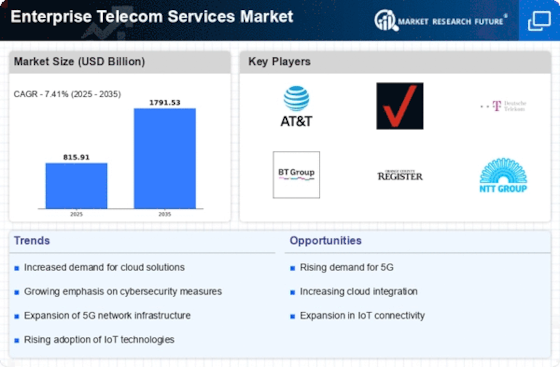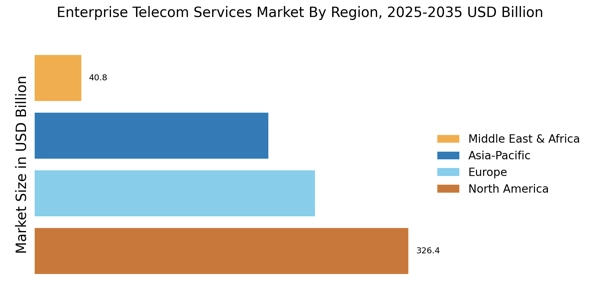Emergence of 5G Technology
The rollout of 5G technology is poised to revolutionize the Enterprise Telecom Services Market. With its promise of ultra-fast data speeds and low latency, 5G is expected to enable new applications and services that were previously unattainable. Enterprises are likely to leverage 5G for enhanced mobile connectivity, IoT deployments, and real-time data processing. Market analysts project that the adoption of 5G services will lead to a substantial increase in telecom revenues, with estimates suggesting a growth rate of over 20% in the next few years. As businesses recognize the potential of 5G, telecom providers are expected to accelerate their investments in infrastructure, further driving market growth.
Increased Focus on Digital Transformation
Digital transformation initiatives are becoming a cornerstone for enterprises aiming to enhance their operational capabilities. The Enterprise Telecom Services Market is witnessing a surge in demand for services that facilitate this transformation. Companies are increasingly investing in advanced telecom solutions to support their digital strategies, which include cloud computing, IoT, and big data analytics. Recent statistics indicate that nearly 70% of organizations are prioritizing digital transformation, which necessitates robust telecom services. This shift not only enhances productivity but also enables businesses to respond swiftly to market changes, thereby driving growth in the telecom sector.
Rising Demand for High-Speed Connectivity
The increasing reliance on digital communication and data transfer has led to a rising demand for high-speed connectivity within the Enterprise Telecom Services Market. Businesses are increasingly adopting fiber-optic networks and 5G technology to enhance their operational efficiency. According to recent data, the demand for high-speed internet services is projected to grow at a compound annual growth rate of over 10% in the coming years. This trend is driven by the need for seamless communication, remote work capabilities, and the proliferation of cloud-based applications. As enterprises seek to improve their connectivity, telecom service providers are likely to invest in infrastructure upgrades, thereby fostering competition and innovation within the market.
Growing Importance of Unified Communications
Unified communications (UC) solutions are gaining traction as businesses recognize the need for integrated communication platforms. The Enterprise Telecom Services Market is experiencing a shift towards UC, which combines voice, video, messaging, and collaboration tools into a single interface. This trend is driven by the need for improved collaboration among remote teams and the desire to streamline communication processes. Market data suggests that the UC market is expected to grow significantly, with a projected increase of over 15% annually. As organizations seek to enhance their communication efficiency, telecom providers are likely to expand their UC offerings, thereby contributing to the overall growth of the industry.
Regulatory Compliance and Data Privacy Concerns
As data privacy regulations become more stringent, enterprises are increasingly focused on compliance within the Enterprise Telecom Services Market. Organizations are required to implement robust telecom solutions that ensure data security and adhere to regulatory standards. This heightened focus on compliance is driving demand for telecom services that offer enhanced security features, such as encryption and secure access controls. Recent surveys indicate that over 60% of businesses consider regulatory compliance a top priority, influencing their choice of telecom providers. Consequently, telecom companies are likely to enhance their service offerings to meet these compliance requirements, thereby shaping the market landscape.

















